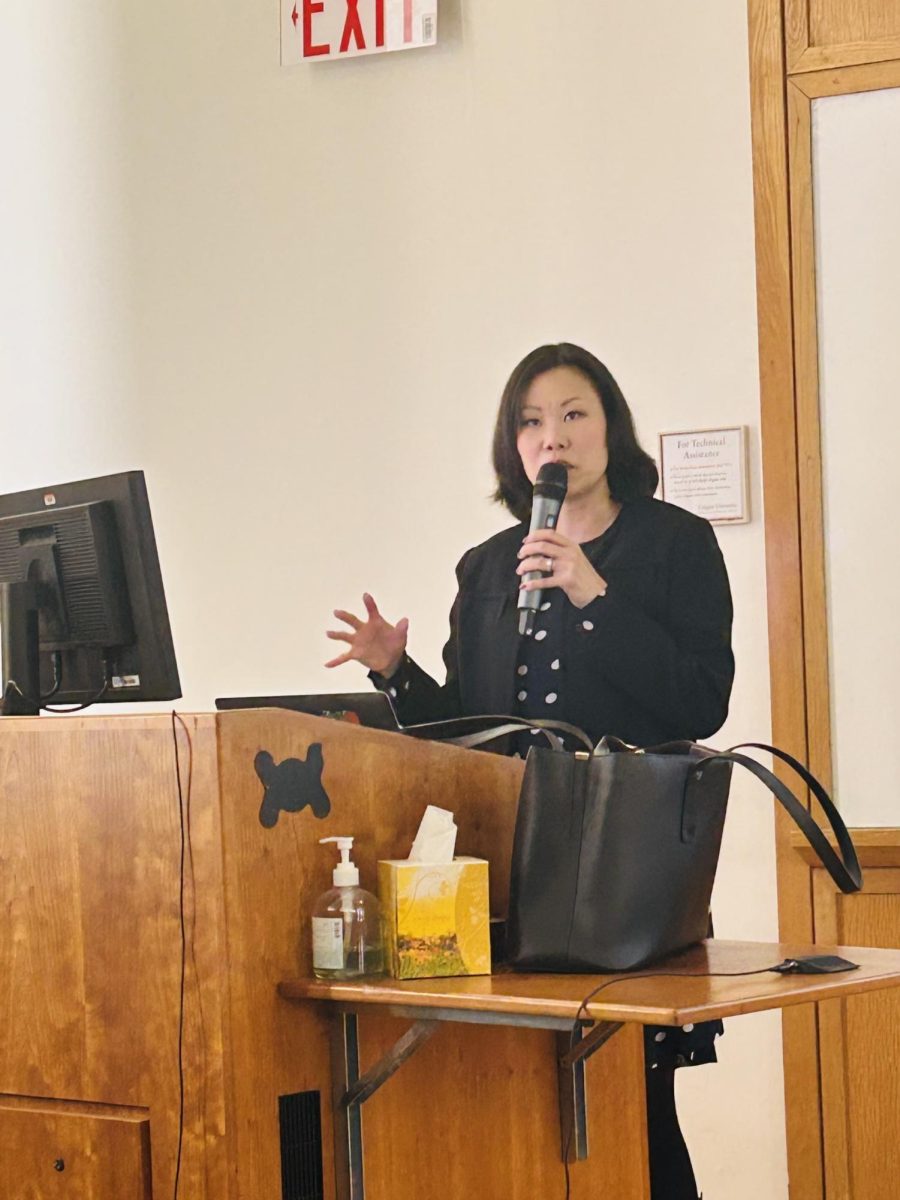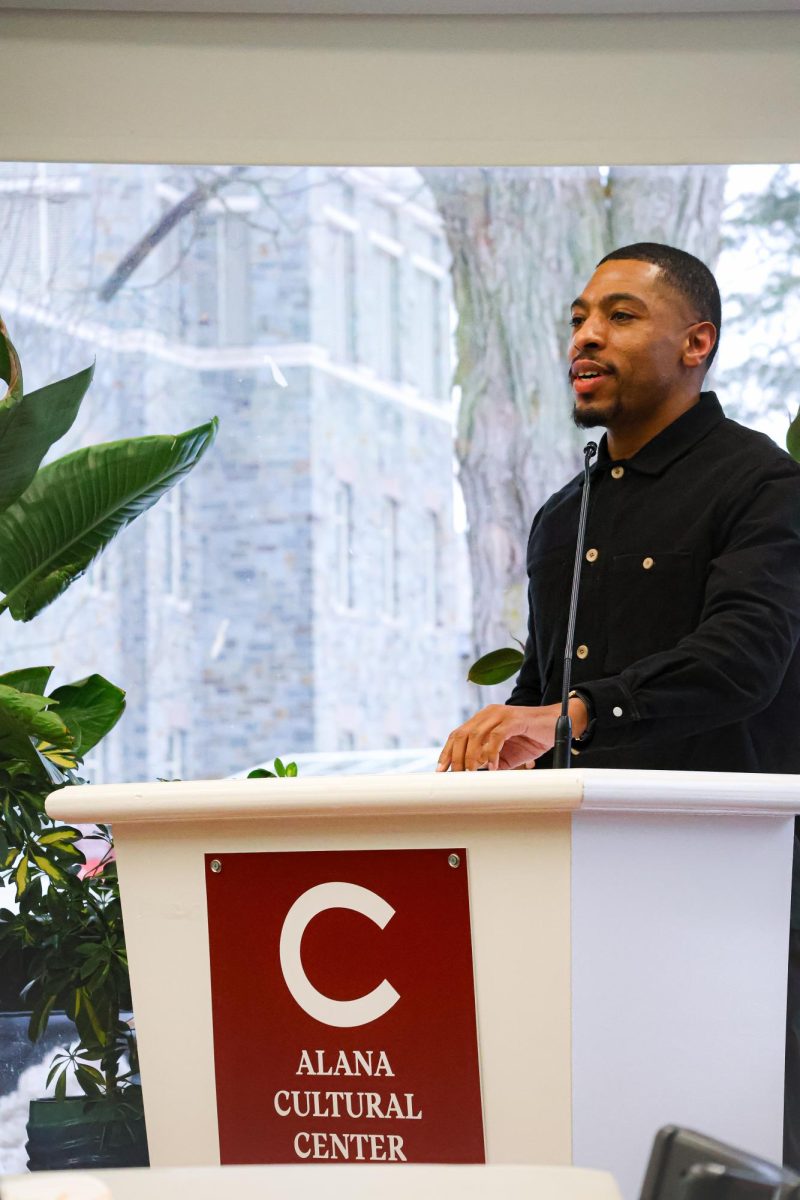The Colgate University Division of University Studies recently announced their new lecture series, University Studies Voices, beginning with a talk from Associate Professor of Writing and Rhetoric Jennifer Lin LeMesurier called “The Dark Side of ‘You Are What You Eat’: Discourses on Asian Food and Asian People” on Thursday, April 18. LeMesurier placed perceptions of Asian food and stereotypes about Asian bodies in conversation with each other. Drawing from research she conducted while writing her book, “Inscrutable Eating: Asian Appetites and the Rhetorics of Asian Consumption,” LeMesurier analyzed critical examples of consumption-centered stereotypes: the rat, the bat and opium.
According to LeMesurier, negative attitudes surrounding Asian food were first manufactured in the United States following an influx of Chinese immigrants in the 1850s. In order to combat the increased competition for jobs, white people presented a binary narrative in which white foods represented strength and masculinity while Asian foods represented scrappiness. Efforts toward emasculation of the Asian body can be seen in media from the late 19th century, such as a pamphlet that compared an American diet of meat to an Asian diet of rice.
LeMesurier explained that this propaganda created gut orientations, a concept which she then defined.
“Gut orientations [are] a habitual reinforcement of visceral feelings that orient you toward, or away from, a particular object,” LeMesurier said.
Negative gut orientations have been impressed upon Chinese food for centuries and then manipulated to make implicit statements about the Asian body. LeMesurier explained that because white people tend to conflate Chinese cuisine with all Asian cuisine, there has been no distinction between cuisines and culture, and all Asians have been subject to stereotypes derived from gut orientations to Chinese food.
Imagery of Asian consumption of rats also contributed to anti-Asian rhetoric. LeMesurier shared an ad for rat poison that included a racist depiction of a “Chinaman” eating a rat.
“[This image insinuates that] the type of man who would consume such a creature is perhaps more creature than human,” LeMesurier said.
LeMesurier elaborated on how, currently, anti-Asian food biases are everywhere, but are often disguised as comedy in pop culture. For example, popular shows like “Big Brother,” “Saturday Night Live” and “The Great British Bake Off” all have had anti-Asian food biases. Additionally, 25 percent of verbal and 58 percent of online incidents of anti-Asian racism revolved around food, according to Stop AAPI Hate. Food, as LeMesurier noted, has become a channel for hatred towards Asian identity and Asian bodies.
“Think about the hyperbolic limits on these jokes,” LeMesurier said. “We have the same fear: You’re eating something strange, and that also means you do strange things in the bedroom, and that means you move beyond the limits of being an American citizen.”
LeMesurier noted that there is a visceral repulsion to Asian foods deemed foreign and disgusting by white audiences, resulting in stereotypes that Asians are unclean, lazy, hypersexual, deviant and conniving. These often subtle rhetorics are especially dangerous considering that eating Asian food is often falsely identified as a palatable form of cross-cultural exploration and appreciation.
First-year Hannah Rocheford attended the event and found that LeMesurier’s analysis of the discourse highlighted new perspectives and encouraged the audience to engage in critical thinking.
“[LeMesurier] brought up really powerful examples, [like] the stereotype of Asians eating bats during [the COVID-19 pandemic] — I can’t believe that happened,” Rocheford said. “It’s really important to talk about the horrible portrayals that have been put out and that continue to happen.”
Director of the University Studies Christopher Henke organized the event in hopes of establishing a recurring tradition of individualized lectures that feature the research and interests of faculty from a diverse array of disciplines in the division.
“Our faculty do not always have the same opportunities to speak in a university-wide setting as other divisions do, so I’ve started this — what I hope is the first in a series of maybe semesterly talks to feature faculty from our division,” Henke said.
The University Studies Voices Lecture Series is an opportunity to nurture a collaborative and uplifting academic environment that also serves as a platform to raise awareness about many different pressing issues. Through faculty-led discussions, the division may also build a sense of community and communication. LeMesurier’s lecture as a debut to the series attempted to emphasize both of the series’ capabilities.
















